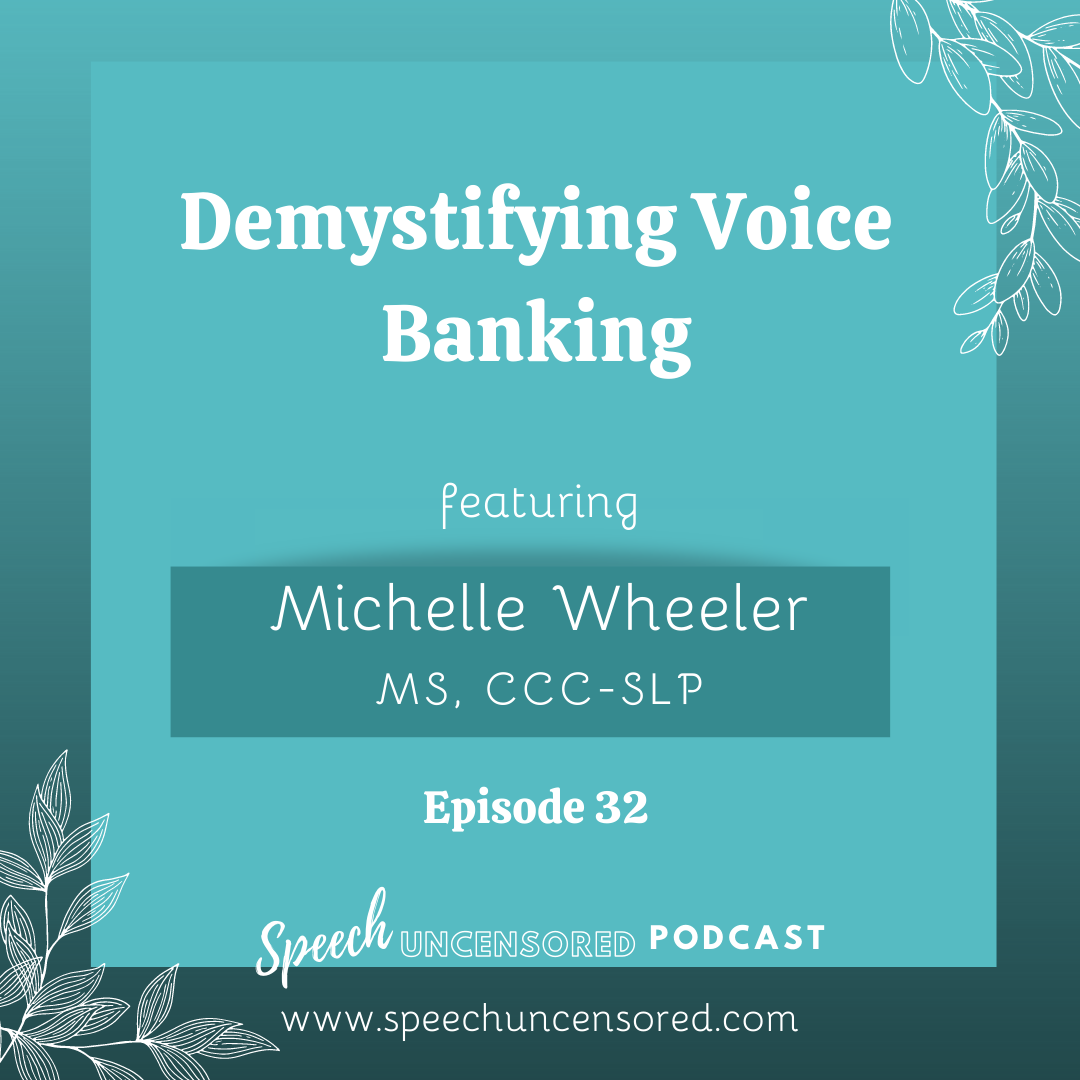Episodes 98 & 99: Equipping Your Therapy Sessions: Parkinson’s and What You Should Know with Hannah Grassie, MS, CCC-SLP
There are many approaches to being an effective therapist when treating specialized populations. “Equipping Your Therapy Sessions: Parkinson’s and What You Should Know” outlines novelties in evaluating and treating Parkinson’s disease (PD) that will increase your confidence and understanding of the Parkinson’s Disease (PD) population. During these two episodes, Hannah will pinpoint crucial questions to address during evaluation, unique considerations for treatment, and delineate a plan for follow-up. With consideration for the research associated with PD, you will be equipped to develop therapy sessions for your patients with Parkinson’s and walk away with resources that your patients can use immediately.
“We have valuable education and tools for this population. I think it’s crucial that we not undersell ourselves. ”
topics covered:
Role of SLP in Parkinson’s disease care
Evaluation and treatment of: Hypophonia, Dysarthria, Cognition, Dysphagia
Patient Counseling
Family Education
Collaboration with Related Professions
Considerations and questions for assessment of persons with PD
pre-assessment and interview questions
Considerations and questions for treatment of persons with PD
components of effective treatment
Evidence-based practice for treatment of Parkinson’s disease
Description and assessing appropriateness of type of intervention
Case Studies
PD resources and tools to build a cohesive carryover
Focusing on follow-up: recommended timelines
Paradigm shift: HMPs v. Ownership Habit
Suggested online and community resources for follow-up
episode 98:
Episode 99:
tools for patients
Davis Phinney Foundation For Parkinson’s
Parkinson’s Foundation: Movement Disorder Specialist Finder
Parkinson’s Foundation: Free PDFs
Parkinson’s Foundation helpline: speak with an RN at 800-473-4636
American Parkinson Disease Association: Free webinar series
Patients who want to be involved in research:
resources to dig deeper
Cognitive and motor speech activities: Honeycomb Speech Therapy & Therapy Insights
Down The Hatch ”Swallowing Disorders in Parkinson’s Disease” episode
Swallow Your Pride, episode 13 with Rebecca Levy, MS, CCC-SLP (don’t forget the show notes!)
Lewy Body Dementia Association chart comparison of LBD and PDD: https://www.lbda.org/sites/default/files/2009_lbd_symptoms_and_dx_criteria_chart.pdf
references
Baijens, Laura W. J., Speyer, Renee (2008) Effects of Therapy for Dysphagia for Parkinson’s Disease: A Systematic Review. Dysphagia. 24:91–102. DOI 10.1007/s00455-008-9180-1
Fabbri M, Guimarães I, Cardoso R, et al. Speech and voice response to a levodopa challenge in late-stage Parkinson’s disease. Front Neurol. 2017;8:432. DOI:10.3389/fneur.2017.00432
Fengler, S., Kessler, J., Timmermann, L., Zapf, A., Elben, S., Wojtecki, L., Tucha, O., & Kalbe, E. (2016). Screening for Cognitive Impairment in Parkinson's Disease: Improving the Diagnostic Utility of the MoCA through Subtest Weighting. PloS one, 11(7), e0159318.
Ho, A.K., Bradshaw, J. L., and Iansek, R. (2007) For better or worse: the effect of Levodopa on speech in Parkinson's disease, Movement Disorders, 23(4), 574–580.
Marras, C., Armstrong, M. J., Meaney, C. A., Fox, S., Rothberg, B., Reginold, W., Tang-Wai, D. F., Gill, D., Eslinger, P. J., Zadikoff, C., Kennedy, N., Marshall, F. J., Mapstone, M., Chou, K. L., Persad, C., Litvan, I., Mast, B. T., Gerstenecker, A. T., Weintraub, S., & Duff-Canning, S. (2013). Measuring mild cognitive impairment in patients with Parkinson's disease. Movement disorders : official journal of the Movement Disorder Society, 28(5), 626–633.
Moya-Galé G, Levy ES. Parkinson’s disease-associated dysarthria: prevalence, impact and management strategies. Research and Reviews in Parkinsonism. 9, 9-16.
Pennington, Susan, snell, Kalyani, Lee, Mark, Walkinger, Richard. (2010) The cause of death in idiopathic Parkinson’s disease. Parkinsonism & Related Disorders, 16(7), 434-437.
Skoda, Sabine. (2012) Effect of Deep Brain Stimulation on Speech Performance in Parkinson's Disease. Parkinson’s Disease. Article ID 850596.
Stathopoulos, E. T., Huber, J. E., Richardson, K., Kamphaus, J., Decicco, D., Darling, M., . . . Sussman, J. E. (2014). Increased vocal intensity due to the Lombard effect in speakers with Parkinson's disease: Simultaneous laryngeal and respiratory strategies. Journal of Communication Disorders, 48, 1-17.
Suttrup, I., Warnecke, T. (2016) Dysphagia in Parkinson’s Disease. Dysphagia 31, 24–32.
Tjaden K, Richards E, Kuo C, Wilding G, Sussman J (2013) Acoustic and Perceptual Consequences of Clear and Loud Speech. Folia Phoniatr Logop. 65:214-220.
Troche MS, Okun MS, Rosenbek JC, Musson N, Fernandez HH, Rodriguez R, Romrell J, Pitts T, Wheeler-Hegland KM, Sapienza CM. Aspiration and swallowing in Parkinson disease and rehabilitation with EMST: a randomized trial. Neurology 2010; 75(21): 1912-9.
Troche, M.S., Sapienza, C.M. & Rosenbek, J.C. (2008) Effects of Bolus Consistency on Timing and Safety of Swallow in Patients with Parkinson’s Disease. Dysphagia 23, 26–32.
Hannah Grassie, MS, CCC-SLP is a clinician in the Washington D.C. metro area and has practiced in settings including special education in schools, skilled nursing facilities, continuing care communities, home health care, and outpatient therapy since 2010. Her primary clinical interest is Parkinson’s disease and she serves as a patient advocate through volunteer work in her community through local and national organizations. Hannah is the founder and blog author of The Parkinson’s Report, an online resource and blog for the Parkinson’s disease community to gain easily navigable resources on relevant topics to their care.
REVIEW the podcast
You’ll earn my undying gratitude by leaving a review on Apple Podcasts! Reviews help other SLPs find the podcast. Also, I love reading your feedback! Just click here to review, select “Ratings and Reviews” and “Write a Review,” and let me know your favorite part of the podcast. Malaho plenty!











